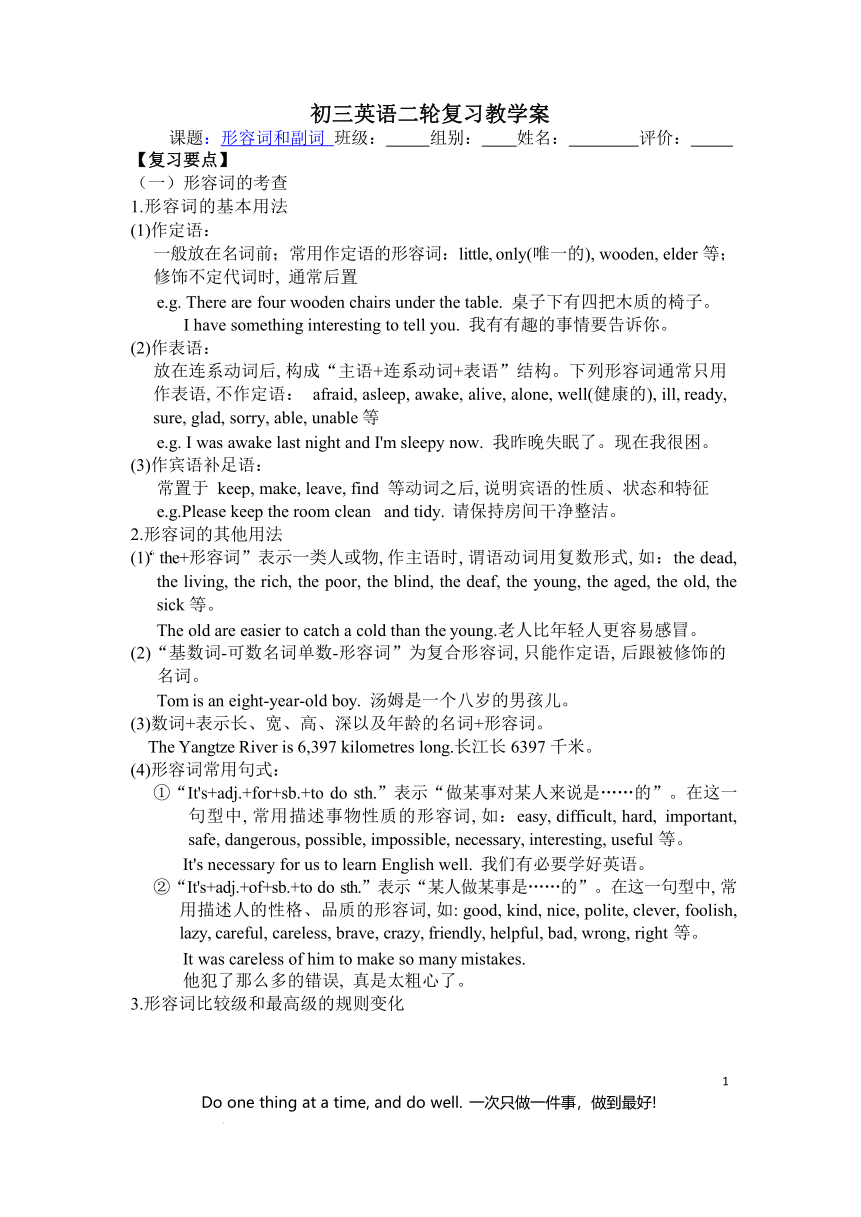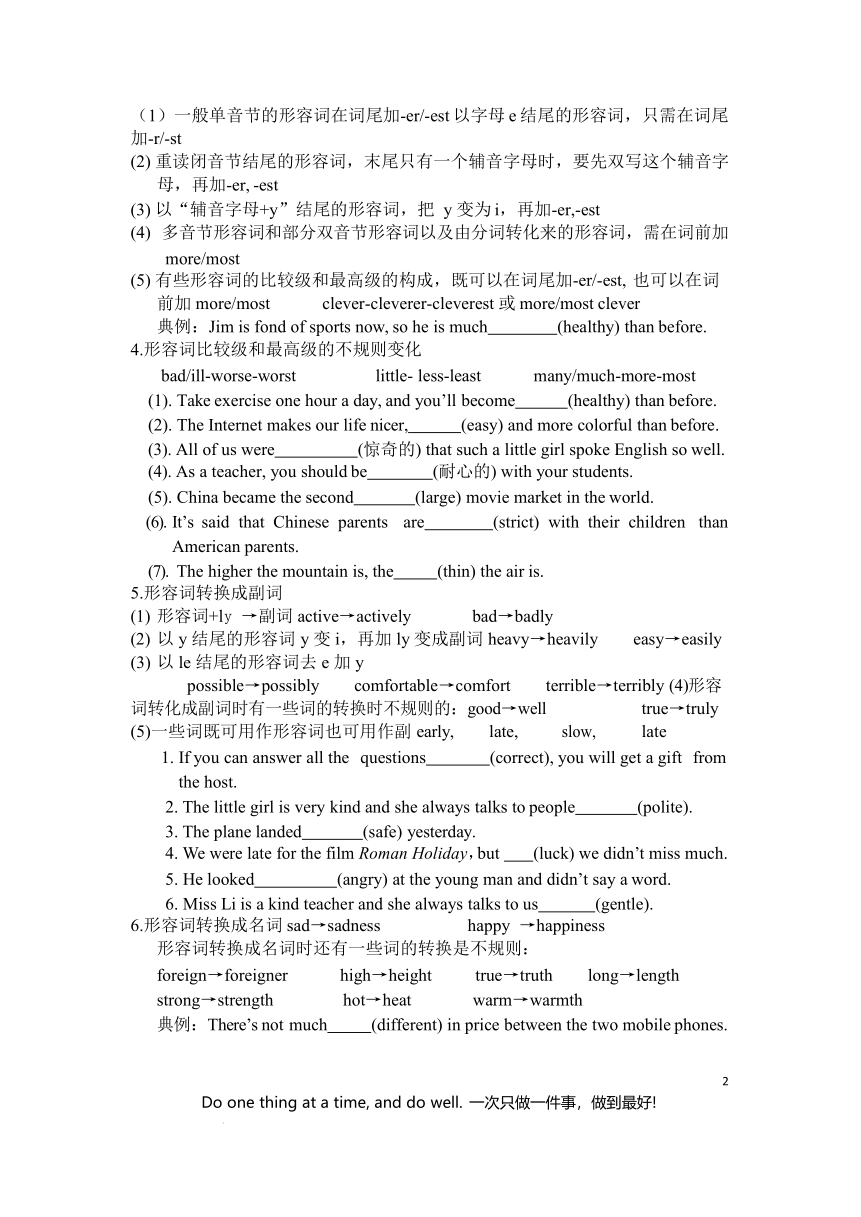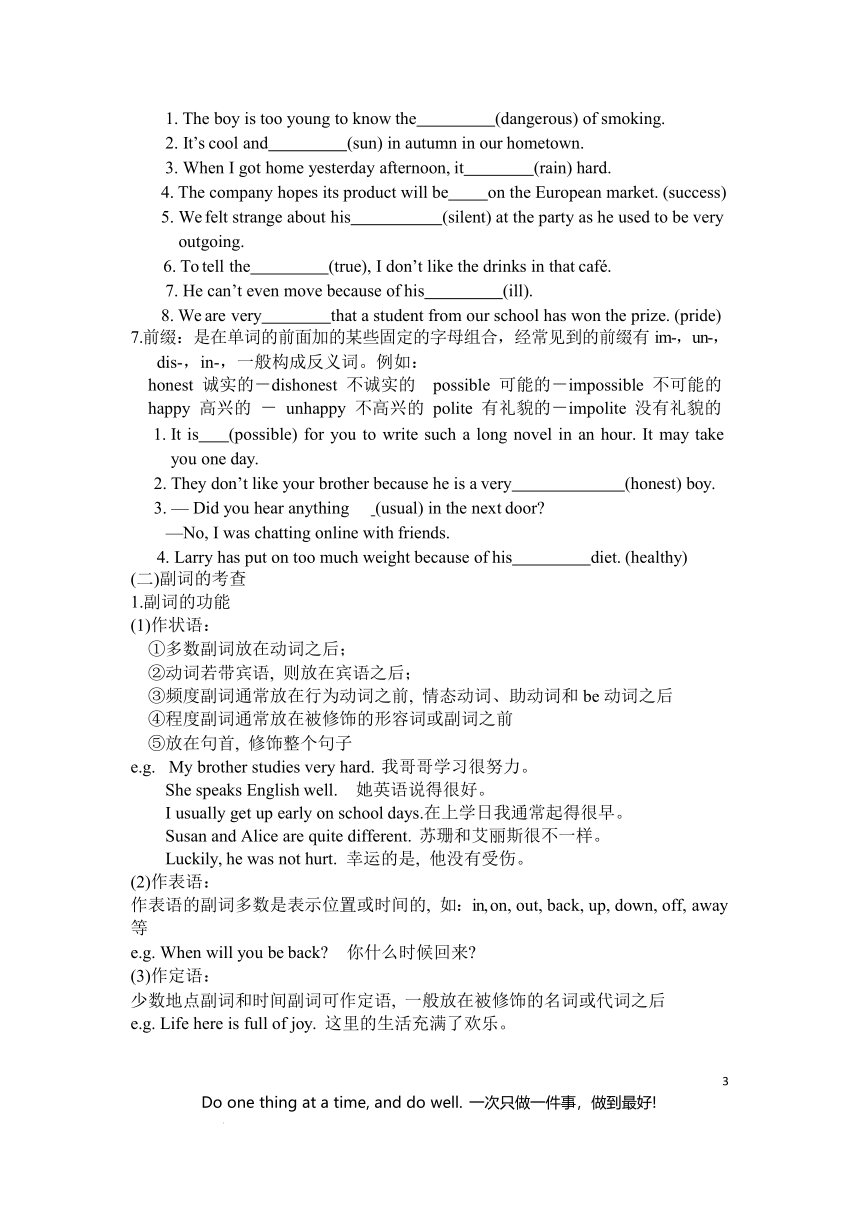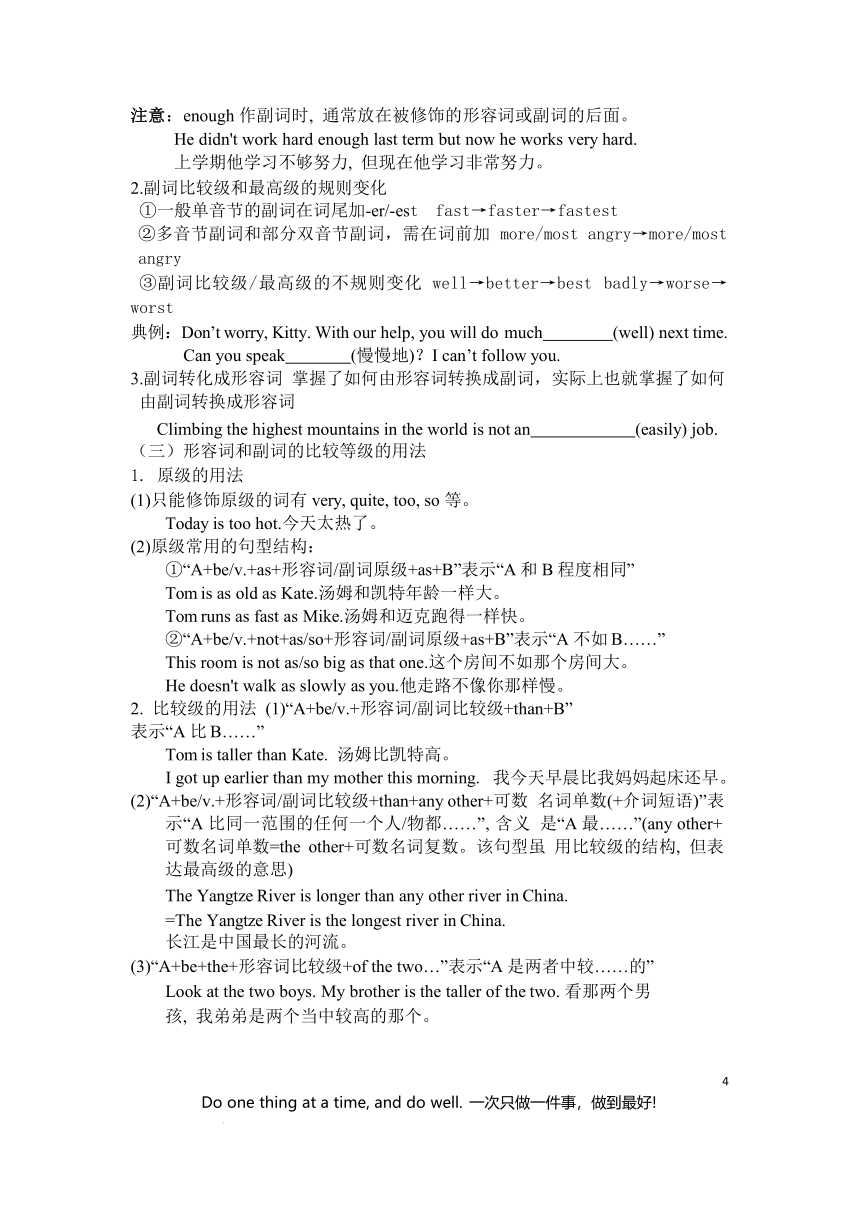2023中考二轮专项复习形容词和副词学案(无答案)
文档属性
| 名称 | 2023中考二轮专项复习形容词和副词学案(无答案) |

|
|
| 格式 | docx | ||
| 文件大小 | 28.8KB | ||
| 资源类型 | 教案 | ||
| 版本资源 | 通用版 | ||
| 科目 | 英语 | ||
| 更新时间 | 2023-05-22 00:00:00 | ||
图片预览




文档简介
初三英语二轮复习教学案
课题:形容词和副词 班级: 组别: 姓名: 评价:
【复习要点】
(一)形容词的考查 1.形容词的基本用法 (1)作定语:
一般放在名词前;常用作定语的形容词:little, only(唯一的), wooden, elder 等; 修饰不定代词时, 通常后置
e.g. There are four wooden chairs under the table. 桌子下有四把木质的椅子。
I have something interesting to tell you. 我有有趣的事情要告诉你。
(2)作表语:
放在连系动词后, 构成“主语+连系动词+表语”结构。下列形容词通常只用 作表语, 不作定语: afraid, asleep, awake, alive, alone, well(健康的), ill, ready, sure, glad, sorry, able, unable 等
e.g. I was awake last night and I'm sleepy now. 我昨晚失眠了。现在我很困。
(3)作宾语补足语:
常置于 keep, make, leave, find 等动词之后, 说明宾语的性质、状态和特征
e.g.Please keep the room clean and tidy. 请保持房间干净整洁。
2.形容词的其他用法
(
1
) (
Do one thing at a time, and do well.
一次只做一件事,做到最好
!
)
(1“)
the+形容词”表示一类人或物, 作主语时, 谓语动词用复数形式, 如:the dead, the living, the rich, the poor, the blind, the deaf, the young, the aged, the old, the sick 等。
The old are easier to catch a cold than the young.老人比年轻人更容易感冒。
(2)“基数词-可数名词单数-形容词”为复合形容词, 只能作定语, 后跟被修饰的 名词。
Tom is an eight-year-old boy. 汤姆是一个八岁的男孩儿。
(3)数词+表示长、宽、高、深以及年龄的名词+形容词。
The Yangtze River is 6,397 kilometres long.长江长 6397 千米。
(4)形容词常用句式:
①“It's+adj.+for+sb.+to do sth.”表示“做某事对某人来说是……的”。在这一 句型中, 常用描述事物性质的形容词, 如:easy, difficult, hard, important, safe, dangerous, possible, impossible, necessary, interesting, useful 等。
It's necessary for us to learn English well. 我们有必要学好英语。
②“It's+adj.+of+sb.+to do sth.”表示“某人做某事是……的”。在这一句型中, 常 用描述人的性格、品质的形容词, 如: good, kind, nice, polite, clever, foolish, lazy, careful, careless, brave, crazy, friendly, helpful, bad, wrong, right 等。
It was careless of him to make so many mistakes.
他犯了那么多的错误, 真是太粗心了。
3.形容词比较级和最高级的规则变化
(1)一般单音节的形容词在词尾加-er/-est 以字母 e 结尾的形容词,只需在词尾 加-r/-st
(2) 重读闭音节结尾的形容词,末尾只有一个辅音字母时,要先双写这个辅音字 母,再加-er, -est
(3) 以“辅音字母+y”结尾的形容词,把 y 变为 i,再加-er,-est
(4) 多音节形容词和部分双音节形容词以及由分词转化来的形容词,需在词前加
more/most
(5) 有些形容词的比较级和最高级的构成,既可以在词尾加-er/-est, 也可以在词 前加 more/most clever-cleverer-cleverest 或 more/most clever
典例:Jim is fond of sports now, so he is much (healthy) than before.
4.形容词比较级和最高级的不规则变化
bad/ill-worse-worst little- less-least many/much-more-most (1). Take exercise one hour a day, and you’ll become (healthy) than before. (2). The Internet makes our life nicer, (easy) and more colorful than before.
All of us were (惊奇的) that such a little girl spoke English so well.
As a teacher, you should be (耐心的) with your students. (5). China became the second (large) movie market in the world.
It’s said that Chinese parents are (strict) with their children than American parents.
The higher the mountain is, the (thin) the air is.
5.形容词转换成副词
形容词+ly →副词 active→actively bad→badly
以 y 结尾的形容词 y 变 i,再加 ly 变成副词 heavy→heavily easy→easily (3) 以 le 结尾的形容词去 e 加 y
possible→possibly comfortable→comfort terrible→terribly (4)形容词转化成副词时有一些词的转换时不规则的:good→well true→truly (5)一些词既可用作形容词也可用作副 early, late, slow, late
If you can answer all the questions (correct), you will get a gift from the host.
The little girl is very kind and she always talks to people (polite).
The plane landed (safe) yesterday.
We were late for the film Roman Holiday,but (luck) we didn’t miss much.
He looked (angry) at the young man and didn’t say a word.
Miss Li is a kind teacher and she always talks to us (gentle). 6.形容词转换成名词 sad→sadness happy →happiness
形容词转换成名词时还有一些词的转换是不规则:
foreign→foreigner high→height true→truth long→length
strong→strength hot→heat warm→warmth
典例:There’s not much (different) in price between the two mobile phones.
The boy is too young to know the (dangerous) of smoking.
It’s cool and (sun) in autumn in our hometown.
When I got home yesterday afternoon, it (rain) hard.
The company hopes its product will be on the European market. (success)
We felt strange about his (silent) at the party as he used to be very outgoing.
To tell the (true), I don’t like the drinks in that café.
He can’t even move because of his (ill).
We are very that a student from our school has won the prize. (pride) 7.前缀:是在单词的前面加的某些固定的字母组合,经常见到的前缀有 im-,un-,
dis-,in-,一般构成反义词。例如:
honest 诚实的-dishonest 不诚实的 possible 可能的-impossible 不可能的
happy 高兴的 - unhappy 不高兴的 polite 有礼貌的-impolite 没有礼貌的
It is (possible) for you to write such a long novel in an hour. It may take you one day.
They don’t like your brother because he is a very (honest) boy.
— Did you hear anything (usual) in the next door
—No, I was chatting online with friends.
Larry has put on too much weight because of his diet. (healthy) (二)副词的考查
1.副词的功能 (1)作状语:
①多数副词放在动词之后;
②动词若带宾语, 则放在宾语之后;
③频度副词通常放在行为动词之前, 情态动词、助动词和 be 动词之后
④程度副词通常放在被修饰的形容词或副词之前
⑤放在句首, 修饰整个句子
e.g. My brother studies very hard. 我哥哥学习很努力。
She speaks English well. 她英语说得很好。
I usually get up early on school days.在上学日我通常起得很早。 Susan and Alice are quite different. 苏珊和艾丽斯很不一样。 Luckily, he was not hurt. 幸运的是, 他没有受伤。
(2)作表语:
作表语的副词多数是表示位置或时间的, 如:in, on, out, back, up, down, off, away
等
e.g. When will you be back 你什么时候回来 (3)作定语:
少数地点副词和时间副词可作定语, 一般放在被修饰的名词或代词之后
e.g. Life here is full of joy. 这里的生活充满了欢乐。
注意:enough 作副词时, 通常放在被修饰的形容词或副词的后面。 He didn't work hard enough last term but now he works very hard. 上学期他学习不够努力, 但现在他学习非常努力。
2.副词比较级和最高级的规则变化
①一般单音节的副词在词尾加-er/-est fast→faster→fastest
②多音节副词和部分双音节副词,需在词前加 more/most angry→more/most angry
③副词比较级/最高级的不规则变化 well→better→best badly→worse→ worst
典例:Don’t worry, Kitty. With our help, you will do much (well) next time.
Can you speak (慢慢地)?I can’t follow you.
3.副词转化成形容词 掌握了如何由形容词转换成副词,实际上也就掌握了如何由副词转换成形容词
Climbing the highest mountains in the world is not an (easily) job.
(三)形容词和副词的比较等级的用法 1. 原级的用法
(1)只能修饰原级的词有 very, quite, too, so 等。
Today is too hot.今天太热了。 (2)原级常用的句型结构:
①“A+be/v.+as+形容词/副词原级+as+B”表示“A 和 B 程度相同” Tom is as old as Kate.汤姆和凯特年龄一样大。
Tom runs as fast as Mike.汤姆和迈克跑得一样快。
②“A+be/v.+not+as/so+形容词/副词原级+as+B”表示“A 不如 B……” This room is not as/so big as that one.这个房间不如那个房间大。
He doesn't walk as slowly as you.他走路不像你那样慢。 2. 比较级的用法 (1)“A+be/v.+形容词/副词比较级+than+B”表示“A 比 B……”
Tom is taller than Kate. 汤姆比凯特高。
I got up earlier than my mother this morning. 我今天早晨比我妈妈起床还早。
(2)“A+be/v.+形容词/副词比较级+than+any other+可数 名词单数(+介词短语)”表示“A 比同一范围的任何一个人/物都……”, 含义 是“A 最……”(any other+可数名词单数=the other+可数名词复数。该句型虽 用比较级的结构, 但表达最高级的意思)
The Yangtze River is longer than any other river in China.
=The Yangtze River is the longest river in China.
长江是中国最长的河流。
(3)“A+be+the+形容词比较级+of the two…”表示“A 是两者中较……的” Look at the two boys. My brother is the taller of the two. 看那两个男孩, 我弟弟是两个当中较高的那个。
(4)“比较级+and+比较级”表示“越来越……”
(若比较级是在原级前加 more 构成的, 则用“more and more+原级”) He is getting taller and taller.他变得越来越高了。
The flowers are getting more and more beautiful.
花儿变得越来越漂亮了。
(5)“the+比较级+主语+谓语, the+比较级+主语+谓语”表示“越……, 就越……” The more careful you are, the fewer mistakes you'll make.
你越仔细, 犯的错误就越少。
(6)“特殊疑问词+be+形容词比较级, A or B ”
Which is bigger, the earth or the moon 哪一个大, 地球还是月球 (7)“特殊疑问词+v.+副词比较级, A or B ”
Who draws better, Jenny or Danny 谁画得比较好, 詹妮还是丹尼 拓展:
(1)比较级前一般可用 much, a little, a lot, even, a bit 等来修饰。
(2)比较对象要相呼应, 比较的内容要相同, 为了避免重复, 可用 one, that, those
或 do 代替前面出现过的名词或动词。
The price of meat is higher than that of rice.肉的价格比大米的价格高。 (3)表示倍数时, 用“倍数+比较级+than”或“倍数+as+形容词原级+as”表示。
This river is three times longer than that one.
=This river is three times as long as that one.这条河是那条河的三倍长。 (4)两者进行比较表示 A 不如 B 时, 部分双音节和多音节形容词或副词, 除使用
“not as/so+形容词或副词原级+as”结构外, 还可使用“less+形容词或副词原级” 结构。
I think English is less interesting than Chinese.
我认为英语没有汉语有趣。
3. 最高级的用法
(1)“主语+be/v.+the+形容词/副词最高级+可数名词单数+in/of/among 短语”表示 “……是……中最……的”。如果在一定的地域空间内进行比较用 in;如果在 同一类事物范围内进行比较用 of 或 among。
Tom is the tallest boy in his class. 汤姆是他班上最高的男孩。
I jump (the) farthest of all the students.我在所有学生中跳得最远。 (2)“主语+be+one of the+形容词/副词最高级+可数名词复数+in/of 短语”表示
“……是……中最……之一”。
Beijing is one of the largest cities in China.
北京是中国最大的城市之一。
(3)“特殊疑问词+be/v.+the+最高级, A, B or C ”用于三者及三者以上的比较。 Which country is the largest, China, Brazil or Canada
哪一个国家最大, 中国、巴西还是加拿大
(4)表示“第几……”用“the+序数词+最高级+名词”。
Li Ming is the second tallest student in the class.
李铭是班里第二高的学生。 注意:
(1)形容词最高级前要加 the, 但当形容词最高级前有物主代词、指示代词、名词 所有格等时, 不加 the。
Millie is my best friend. 米莉是我最好的朋友。
(2)如果形容词最高级前没有 the, 就没有比较的意思, 只是加强语气, 有“很, 非 常”之意。
This is a most beautiful park.这是一个很美的公园。 (3)副词最高级前的 the 可以省略。
4.数量的比较
我们用 more…than 和 fewer/less…than 来比较人或事物的数量。用 the most 表 示最多的数量;用 the fewest/the least 表示最少的数量。
more…than 意为“比……多”。其中, more 是形容词 many 和 much 的比较级, 其 后可以跟不可数名词或可数名词复数。
fewer/less…than 意为“比……少”。其中, fewer 是形容词 few 的比较级, 其后跟 可数名词复数;less 是形容词 little 的比较级, 其后跟不可数名词。
(3)most 是形容词 many 和 much 的最高级, 意为“最多的”。当三者或三者以上的 人或事物作比较时, 数量最多的用 the most, 后面可以跟可数名词复数或不 可数名词。
(4)fewest 和 least 分别是形容词 few 和 little 的最高级, 意为“最少的”。当三者或 三者以上的人或事物作比较时, 数量最少的用 the fewest 或 the least。the fewest 后跟可数名词复数, the least 后跟不可数名词。
【当堂检测】
He is even (care) than last time. So he makes fewer mistakes.
This is the (bad) restaurant that I have ever been to. Its dishes and service aren't good at all on China Tourism Day this year.
Lucy is one of the girls in our class. (tall)
She (sudden) found herself being talked about in all the newspaper.
Some students in western areas are too (poor) to afford pens and notebooks.
As time goes, my grandmother can’t see as (clear) as she used to.
Audrey Hepburn’s dream was to become a (success) ballet dancer.
It is (possible) to finish the work within such a short time.
English is (wide) spoken in the world.
He was (surprise) at those (rob) which happened two days ago.
【课后巩固】 一、单项选择。
[2021·淮安] —Why don't you buy the beautiful T-shirt
—It's too . I don't have enough money to buy it.
new B. old C. cheap D. expensive
[2021·淮安] There is a lot of traffic in the street. Please drive . .
careful B. careless C. carefully D. carelessly
[2020·淮安] —Peter, have you heard of the song Let it go
—Yes, it sounds and it's popular among young people.
nice B. bad C. terrible D. strange
[2019·淮安] —What do you think of working as a doctor
—It's a good job to help people keep .
busy B. strict C. healthy D. generous
[2017·淮安] —I feel very . May I have a cake
—Sure, you may take one from the fridge.
brave B. thirsty C. full D. hungry
As the new table takes up space than the old one, we have more room now.
many more B. far less C. too little D. much fewer
—How hard you are working, Helen!
—We must! President Xi Jinping said that we are, we will be.
the more hard-working;the luckier B. the hard-working;the lucky
C. more hard-working;luckier D. the most hard-working;the luckiest
—You want to lose weight But why You look quite slim to me.
—That may be true. But I'm than last year.
much heavier B. heavy enough C. much lighter D. light
二、用所给词的适当形式填空。
It isn't fine today. The radio says it's getting even (cloud).
He has finished five _ (twelve) of his homework.
Jack, a friend of _ (they), went to Canada for a visit last week.
We are even (tire) after a long walk.
Nobody stayed (happy) after the traffic accident.
Which do you like (good), madam, orange or coffee
It’s said that Chinese parents are (strict) with their children than American parents.
How (care) you are! You’ve knocked the cup off the table again!
Now Mom feels much better after taking the (medical).
Kids, help to some fruit, it’s good for your health. (you)
Millie tried her best but did (bad) among all the members in the team.
It’s (fair) for the workers to get so little money for so much work.
The Bruce family had to give up camping in the Purple Mountain on such a
(fog) day.
Which do you think is (interesting), going on a picnic or going fishing
The man was breathing (heavy) and had blood on his shirt.
, the “Chinese Dream” will come true in the near future. (hope) .
There are a lot of tall buildings on (twelve) Street.
You’ll soon feel much (health) if you take more exercise.
The young mother didn’t know why the baby was crying (noise) than before.
There are many (different) between living in the city and living in the country.
The Great Wall is one of the (great) wonders in the world.
After doing sports for months, Tina is becoming (thin) than before.
课题:形容词和副词 班级: 组别: 姓名: 评价:
【复习要点】
(一)形容词的考查 1.形容词的基本用法 (1)作定语:
一般放在名词前;常用作定语的形容词:little, only(唯一的), wooden, elder 等; 修饰不定代词时, 通常后置
e.g. There are four wooden chairs under the table. 桌子下有四把木质的椅子。
I have something interesting to tell you. 我有有趣的事情要告诉你。
(2)作表语:
放在连系动词后, 构成“主语+连系动词+表语”结构。下列形容词通常只用 作表语, 不作定语: afraid, asleep, awake, alive, alone, well(健康的), ill, ready, sure, glad, sorry, able, unable 等
e.g. I was awake last night and I'm sleepy now. 我昨晚失眠了。现在我很困。
(3)作宾语补足语:
常置于 keep, make, leave, find 等动词之后, 说明宾语的性质、状态和特征
e.g.Please keep the room clean and tidy. 请保持房间干净整洁。
2.形容词的其他用法
(
1
) (
Do one thing at a time, and do well.
一次只做一件事,做到最好
!
)
(1“)
the+形容词”表示一类人或物, 作主语时, 谓语动词用复数形式, 如:the dead, the living, the rich, the poor, the blind, the deaf, the young, the aged, the old, the sick 等。
The old are easier to catch a cold than the young.老人比年轻人更容易感冒。
(2)“基数词-可数名词单数-形容词”为复合形容词, 只能作定语, 后跟被修饰的 名词。
Tom is an eight-year-old boy. 汤姆是一个八岁的男孩儿。
(3)数词+表示长、宽、高、深以及年龄的名词+形容词。
The Yangtze River is 6,397 kilometres long.长江长 6397 千米。
(4)形容词常用句式:
①“It's+adj.+for+sb.+to do sth.”表示“做某事对某人来说是……的”。在这一 句型中, 常用描述事物性质的形容词, 如:easy, difficult, hard, important, safe, dangerous, possible, impossible, necessary, interesting, useful 等。
It's necessary for us to learn English well. 我们有必要学好英语。
②“It's+adj.+of+sb.+to do sth.”表示“某人做某事是……的”。在这一句型中, 常 用描述人的性格、品质的形容词, 如: good, kind, nice, polite, clever, foolish, lazy, careful, careless, brave, crazy, friendly, helpful, bad, wrong, right 等。
It was careless of him to make so many mistakes.
他犯了那么多的错误, 真是太粗心了。
3.形容词比较级和最高级的规则变化
(1)一般单音节的形容词在词尾加-er/-est 以字母 e 结尾的形容词,只需在词尾 加-r/-st
(2) 重读闭音节结尾的形容词,末尾只有一个辅音字母时,要先双写这个辅音字 母,再加-er, -est
(3) 以“辅音字母+y”结尾的形容词,把 y 变为 i,再加-er,-est
(4) 多音节形容词和部分双音节形容词以及由分词转化来的形容词,需在词前加
more/most
(5) 有些形容词的比较级和最高级的构成,既可以在词尾加-er/-est, 也可以在词 前加 more/most clever-cleverer-cleverest 或 more/most clever
典例:Jim is fond of sports now, so he is much (healthy) than before.
4.形容词比较级和最高级的不规则变化
bad/ill-worse-worst little- less-least many/much-more-most (1). Take exercise one hour a day, and you’ll become (healthy) than before. (2). The Internet makes our life nicer, (easy) and more colorful than before.
All of us were (惊奇的) that such a little girl spoke English so well.
As a teacher, you should be (耐心的) with your students. (5). China became the second (large) movie market in the world.
It’s said that Chinese parents are (strict) with their children than American parents.
The higher the mountain is, the (thin) the air is.
5.形容词转换成副词
形容词+ly →副词 active→actively bad→badly
以 y 结尾的形容词 y 变 i,再加 ly 变成副词 heavy→heavily easy→easily (3) 以 le 结尾的形容词去 e 加 y
possible→possibly comfortable→comfort terrible→terribly (4)形容词转化成副词时有一些词的转换时不规则的:good→well true→truly (5)一些词既可用作形容词也可用作副 early, late, slow, late
If you can answer all the questions (correct), you will get a gift from the host.
The little girl is very kind and she always talks to people (polite).
The plane landed (safe) yesterday.
We were late for the film Roman Holiday,but (luck) we didn’t miss much.
He looked (angry) at the young man and didn’t say a word.
Miss Li is a kind teacher and she always talks to us (gentle). 6.形容词转换成名词 sad→sadness happy →happiness
形容词转换成名词时还有一些词的转换是不规则:
foreign→foreigner high→height true→truth long→length
strong→strength hot→heat warm→warmth
典例:There’s not much (different) in price between the two mobile phones.
The boy is too young to know the (dangerous) of smoking.
It’s cool and (sun) in autumn in our hometown.
When I got home yesterday afternoon, it (rain) hard.
The company hopes its product will be on the European market. (success)
We felt strange about his (silent) at the party as he used to be very outgoing.
To tell the (true), I don’t like the drinks in that café.
He can’t even move because of his (ill).
We are very that a student from our school has won the prize. (pride) 7.前缀:是在单词的前面加的某些固定的字母组合,经常见到的前缀有 im-,un-,
dis-,in-,一般构成反义词。例如:
honest 诚实的-dishonest 不诚实的 possible 可能的-impossible 不可能的
happy 高兴的 - unhappy 不高兴的 polite 有礼貌的-impolite 没有礼貌的
It is (possible) for you to write such a long novel in an hour. It may take you one day.
They don’t like your brother because he is a very (honest) boy.
— Did you hear anything (usual) in the next door
—No, I was chatting online with friends.
Larry has put on too much weight because of his diet. (healthy) (二)副词的考查
1.副词的功能 (1)作状语:
①多数副词放在动词之后;
②动词若带宾语, 则放在宾语之后;
③频度副词通常放在行为动词之前, 情态动词、助动词和 be 动词之后
④程度副词通常放在被修饰的形容词或副词之前
⑤放在句首, 修饰整个句子
e.g. My brother studies very hard. 我哥哥学习很努力。
She speaks English well. 她英语说得很好。
I usually get up early on school days.在上学日我通常起得很早。 Susan and Alice are quite different. 苏珊和艾丽斯很不一样。 Luckily, he was not hurt. 幸运的是, 他没有受伤。
(2)作表语:
作表语的副词多数是表示位置或时间的, 如:in, on, out, back, up, down, off, away
等
e.g. When will you be back 你什么时候回来 (3)作定语:
少数地点副词和时间副词可作定语, 一般放在被修饰的名词或代词之后
e.g. Life here is full of joy. 这里的生活充满了欢乐。
注意:enough 作副词时, 通常放在被修饰的形容词或副词的后面。 He didn't work hard enough last term but now he works very hard. 上学期他学习不够努力, 但现在他学习非常努力。
2.副词比较级和最高级的规则变化
①一般单音节的副词在词尾加-er/-est fast→faster→fastest
②多音节副词和部分双音节副词,需在词前加 more/most angry→more/most angry
③副词比较级/最高级的不规则变化 well→better→best badly→worse→ worst
典例:Don’t worry, Kitty. With our help, you will do much (well) next time.
Can you speak (慢慢地)?I can’t follow you.
3.副词转化成形容词 掌握了如何由形容词转换成副词,实际上也就掌握了如何由副词转换成形容词
Climbing the highest mountains in the world is not an (easily) job.
(三)形容词和副词的比较等级的用法 1. 原级的用法
(1)只能修饰原级的词有 very, quite, too, so 等。
Today is too hot.今天太热了。 (2)原级常用的句型结构:
①“A+be/v.+as+形容词/副词原级+as+B”表示“A 和 B 程度相同” Tom is as old as Kate.汤姆和凯特年龄一样大。
Tom runs as fast as Mike.汤姆和迈克跑得一样快。
②“A+be/v.+not+as/so+形容词/副词原级+as+B”表示“A 不如 B……” This room is not as/so big as that one.这个房间不如那个房间大。
He doesn't walk as slowly as you.他走路不像你那样慢。 2. 比较级的用法 (1)“A+be/v.+形容词/副词比较级+than+B”表示“A 比 B……”
Tom is taller than Kate. 汤姆比凯特高。
I got up earlier than my mother this morning. 我今天早晨比我妈妈起床还早。
(2)“A+be/v.+形容词/副词比较级+than+any other+可数 名词单数(+介词短语)”表示“A 比同一范围的任何一个人/物都……”, 含义 是“A 最……”(any other+可数名词单数=the other+可数名词复数。该句型虽 用比较级的结构, 但表达最高级的意思)
The Yangtze River is longer than any other river in China.
=The Yangtze River is the longest river in China.
长江是中国最长的河流。
(3)“A+be+the+形容词比较级+of the two…”表示“A 是两者中较……的” Look at the two boys. My brother is the taller of the two. 看那两个男孩, 我弟弟是两个当中较高的那个。
(4)“比较级+and+比较级”表示“越来越……”
(若比较级是在原级前加 more 构成的, 则用“more and more+原级”) He is getting taller and taller.他变得越来越高了。
The flowers are getting more and more beautiful.
花儿变得越来越漂亮了。
(5)“the+比较级+主语+谓语, the+比较级+主语+谓语”表示“越……, 就越……” The more careful you are, the fewer mistakes you'll make.
你越仔细, 犯的错误就越少。
(6)“特殊疑问词+be+形容词比较级, A or B ”
Which is bigger, the earth or the moon 哪一个大, 地球还是月球 (7)“特殊疑问词+v.+副词比较级, A or B ”
Who draws better, Jenny or Danny 谁画得比较好, 詹妮还是丹尼 拓展:
(1)比较级前一般可用 much, a little, a lot, even, a bit 等来修饰。
(2)比较对象要相呼应, 比较的内容要相同, 为了避免重复, 可用 one, that, those
或 do 代替前面出现过的名词或动词。
The price of meat is higher than that of rice.肉的价格比大米的价格高。 (3)表示倍数时, 用“倍数+比较级+than”或“倍数+as+形容词原级+as”表示。
This river is three times longer than that one.
=This river is three times as long as that one.这条河是那条河的三倍长。 (4)两者进行比较表示 A 不如 B 时, 部分双音节和多音节形容词或副词, 除使用
“not as/so+形容词或副词原级+as”结构外, 还可使用“less+形容词或副词原级” 结构。
I think English is less interesting than Chinese.
我认为英语没有汉语有趣。
3. 最高级的用法
(1)“主语+be/v.+the+形容词/副词最高级+可数名词单数+in/of/among 短语”表示 “……是……中最……的”。如果在一定的地域空间内进行比较用 in;如果在 同一类事物范围内进行比较用 of 或 among。
Tom is the tallest boy in his class. 汤姆是他班上最高的男孩。
I jump (the) farthest of all the students.我在所有学生中跳得最远。 (2)“主语+be+one of the+形容词/副词最高级+可数名词复数+in/of 短语”表示
“……是……中最……之一”。
Beijing is one of the largest cities in China.
北京是中国最大的城市之一。
(3)“特殊疑问词+be/v.+the+最高级, A, B or C ”用于三者及三者以上的比较。 Which country is the largest, China, Brazil or Canada
哪一个国家最大, 中国、巴西还是加拿大
(4)表示“第几……”用“the+序数词+最高级+名词”。
Li Ming is the second tallest student in the class.
李铭是班里第二高的学生。 注意:
(1)形容词最高级前要加 the, 但当形容词最高级前有物主代词、指示代词、名词 所有格等时, 不加 the。
Millie is my best friend. 米莉是我最好的朋友。
(2)如果形容词最高级前没有 the, 就没有比较的意思, 只是加强语气, 有“很, 非 常”之意。
This is a most beautiful park.这是一个很美的公园。 (3)副词最高级前的 the 可以省略。
4.数量的比较
我们用 more…than 和 fewer/less…than 来比较人或事物的数量。用 the most 表 示最多的数量;用 the fewest/the least 表示最少的数量。
more…than 意为“比……多”。其中, more 是形容词 many 和 much 的比较级, 其 后可以跟不可数名词或可数名词复数。
fewer/less…than 意为“比……少”。其中, fewer 是形容词 few 的比较级, 其后跟 可数名词复数;less 是形容词 little 的比较级, 其后跟不可数名词。
(3)most 是形容词 many 和 much 的最高级, 意为“最多的”。当三者或三者以上的 人或事物作比较时, 数量最多的用 the most, 后面可以跟可数名词复数或不 可数名词。
(4)fewest 和 least 分别是形容词 few 和 little 的最高级, 意为“最少的”。当三者或 三者以上的人或事物作比较时, 数量最少的用 the fewest 或 the least。the fewest 后跟可数名词复数, the least 后跟不可数名词。
【当堂检测】
He is even (care) than last time. So he makes fewer mistakes.
This is the (bad) restaurant that I have ever been to. Its dishes and service aren't good at all on China Tourism Day this year.
Lucy is one of the girls in our class. (tall)
She (sudden) found herself being talked about in all the newspaper.
Some students in western areas are too (poor) to afford pens and notebooks.
As time goes, my grandmother can’t see as (clear) as she used to.
Audrey Hepburn’s dream was to become a (success) ballet dancer.
It is (possible) to finish the work within such a short time.
English is (wide) spoken in the world.
He was (surprise) at those (rob) which happened two days ago.
【课后巩固】 一、单项选择。
[2021·淮安] —Why don't you buy the beautiful T-shirt
—It's too . I don't have enough money to buy it.
new B. old C. cheap D. expensive
[2021·淮安] There is a lot of traffic in the street. Please drive . .
careful B. careless C. carefully D. carelessly
[2020·淮安] —Peter, have you heard of the song Let it go
—Yes, it sounds and it's popular among young people.
nice B. bad C. terrible D. strange
[2019·淮安] —What do you think of working as a doctor
—It's a good job to help people keep .
busy B. strict C. healthy D. generous
[2017·淮安] —I feel very . May I have a cake
—Sure, you may take one from the fridge.
brave B. thirsty C. full D. hungry
As the new table takes up space than the old one, we have more room now.
many more B. far less C. too little D. much fewer
—How hard you are working, Helen!
—We must! President Xi Jinping said that we are, we will be.
the more hard-working;the luckier B. the hard-working;the lucky
C. more hard-working;luckier D. the most hard-working;the luckiest
—You want to lose weight But why You look quite slim to me.
—That may be true. But I'm than last year.
much heavier B. heavy enough C. much lighter D. light
二、用所给词的适当形式填空。
It isn't fine today. The radio says it's getting even (cloud).
He has finished five _ (twelve) of his homework.
Jack, a friend of _ (they), went to Canada for a visit last week.
We are even (tire) after a long walk.
Nobody stayed (happy) after the traffic accident.
Which do you like (good), madam, orange or coffee
It’s said that Chinese parents are (strict) with their children than American parents.
How (care) you are! You’ve knocked the cup off the table again!
Now Mom feels much better after taking the (medical).
Kids, help to some fruit, it’s good for your health. (you)
Millie tried her best but did (bad) among all the members in the team.
It’s (fair) for the workers to get so little money for so much work.
The Bruce family had to give up camping in the Purple Mountain on such a
(fog) day.
Which do you think is (interesting), going on a picnic or going fishing
The man was breathing (heavy) and had blood on his shirt.
, the “Chinese Dream” will come true in the near future. (hope) .
There are a lot of tall buildings on (twelve) Street.
You’ll soon feel much (health) if you take more exercise.
The young mother didn’t know why the baby was crying (noise) than before.
There are many (different) between living in the city and living in the country.
The Great Wall is one of the (great) wonders in the world.
After doing sports for months, Tina is becoming (thin) than before.
同课章节目录
- 词法
- 名词
- 动词和动词短语
- 动词语态
- 动词时态
- 助动词和情态动词
- 非谓语动词
- 冠词
- 代词
- 数词和量词
- 形容词副词及其比较等级
- 介词和介词短语
- 连词和感叹词
- 构词法
- 相似、相近词比较
- 句法
- 陈述句
- 一般疑问句和否定疑问句
- 特殊疑问句及选择疑问句
- 反意疑问句
- 存在句(There be句型)
- 宾语从句
- 定语从句
- 状语从句
- 主谓一致问题
- 简单句
- 并列句
- 复合句
- 主谓一致
- 主、表语从句
- 名词性从句
- 直接引语和间接引语
- 虚拟语气
- 感叹句
- 强调句
- 倒装句
- 祈使句
- 句子的成分
- 句子的分类
- 题型专区
- 单项选择部分
- 易错题
- 完形填空
- 阅读理解
- 词汇练习
- 听说训练
- 句型转换
- 补全对话
- 短文改错
- 翻译
- 书面表达
- 任务型阅读
- 语法填空
- 其他资料
